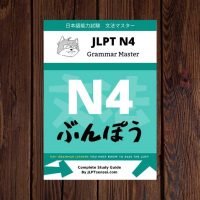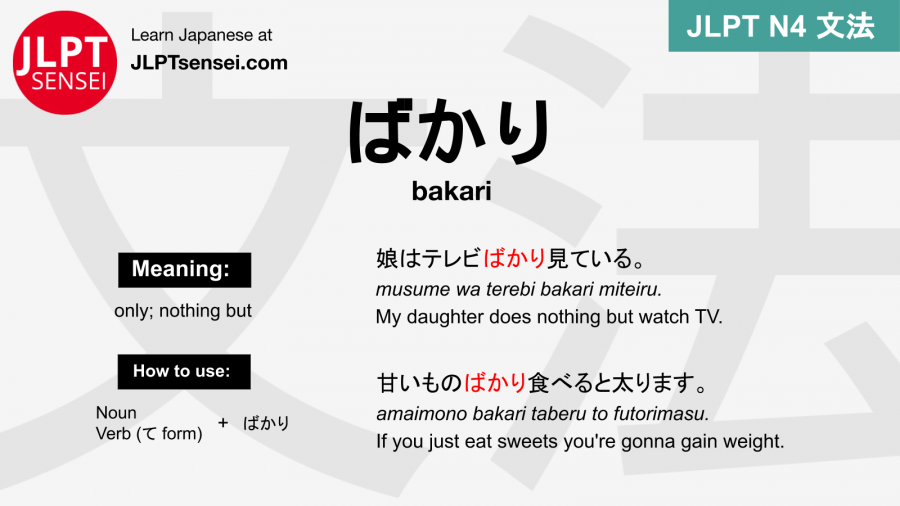Aprende gramática del idioma Japonés: ばかり (bakari). Significado: only; nothing but~.
- This grammar point literally means «only» or «nothing but», and is often used to express surprise, shock, and even judgement (in a negative way).
- It is not always used in a negative way, and can simply be used to say «only» or express surprise.
- You’ll have to interpret the intended meaning based on the context.
Example A
6月は雨ばかりです!
roku gatsu wa ame bakari desu!
It’s constantly raining in June / It’s nothing but rain, It’s always raining, etc..
Other Variations
ばかり (bakari) is a very complex grammar point with many different variations.
- When used with a noun that indicates time or distance it means «about». See N2 lesson for ばかり (bakari).
- To describe a negative continuous / repetitive action, use ばかりいる (bakari iru)
- When used with a past tense verb it means «just finished». See たばかり (ta bakari).

Click the image to download the flashcard.
Download all N4 grammar flashcards.

Download our complete
JLPT N4 Grammar Master E-book.
Access ALL extra downloads, ebooks, and study guides by supporting JLPT Sensei on Patreon.
ばかり - Oraciones de ejemplos 例文
Cada oración de ejemplo incluye ayudas como la lectura (hiragana) en Japónes, la lectura en romaji, y la traducción en Español.
Da clic en el siguiente botón rojo para alternar todas las ayudas, o puedes dar clic en los botones individuales para mostrar únicamente las que desees ver.
Ejemplo #1
娘はテレビばかり見ている。
Ejemplo #2
彼はお金ばかり考えている。
Ejemplo #3
甘いものばかり食べると太ります。
Ejemplo #4
嘘ばかりつく人が嫌いだ。
Ejemplo #5
得るものはなく、失うものばかりだ。
Ejemplo #6
このカフェのお客さんは女性ばかりですね。
Ejemplo #7
子どもの頃は体が弱くて病気ばかりしていました。
Vocabulario 語彙
| Kanji 漢字 |
Kana カナ |
English 英語 |
|---|---|---|
| 雨 | あめ | rain |
| 娘 | むすめ | daughter |
| 彼 | かれ | he |
| 考える | かんがえる | to think |
| お客さん | おきゃくさん | customer |
| 女性 | じょせい | girl; female |
| 甘いもの | あまいもの | sweets |
| 太る | ふとる | to gain weight |
| 嘘 | うそ | lie |
| 嫌い | きらい | hate |
| 得る | える | to gain |
| 失う | うしなう | to lose |
| 頃 | ころ | time period |
| 体 | からだ | body |
| 弱い | よわい | weak |
| 病気 | びょき | sick |
Ver todas las lecciones de gramática del JLPT N4



